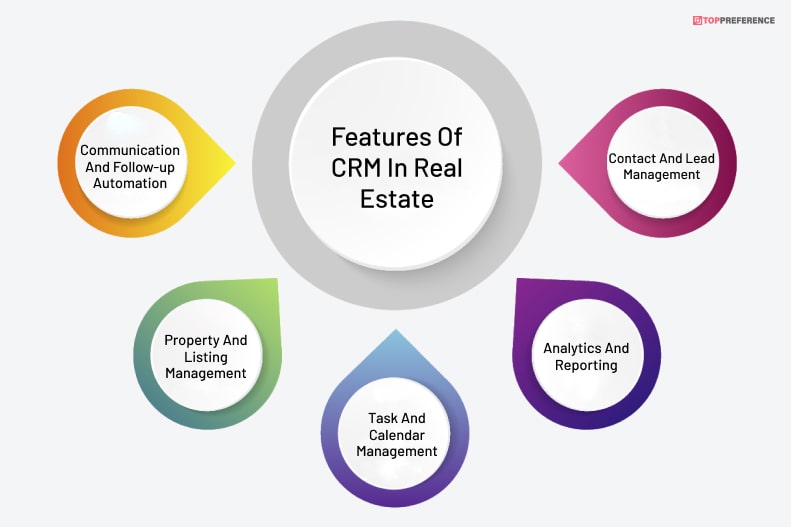What Is A CRM In Real Estate? Things You Should Know In 2023
Are you searching for the answer to what is a CRM in real estate? If yes, then you have reached the right place!
A CRM, or Customer Relationship Management, is a software system designed to help businesses effectively manage their interactions and relationships with customers. It serves as a centralized hub for storing and organizing customer data, including contact information, communication history, purchase history, and preferences.
A CRM enables businesses to track and manage leads, automate communication and follow-ups, and streamline sales and marketing processes. It provides tools for task management, appointment scheduling, and collaboration among team members. By utilizing a CRM, businesses can improve customer satisfaction, enhance lead conversion rates, and optimize their sales and marketing efforts.
The system also generates valuable insights and reports that help businesses make data-driven decisions and build stronger, long-lasting customer relationships.
But how can it help in real estate? Keep reading this article till the end to learn more about the same?
What Is A CRM In Real Estate?��

In the context of real estate, CRM stands for Customer Relationship Management. A CRM system is a software tool or platform that helps professionals in real estate manage and organize their interactions with clients, prospects, and other stakeholders involved in the buying, selling, or renting of properties.
A CRM in real estate typically provides a centralized database to store and manage information about leads, clients, properties, and transactions. It allows real estate agents, brokers, and other professionals to track their interactions with clients, schedule appointments, manage follow-ups, and maintain a history of communication.
Features Of CRM In Real Estate��

Now that you know what CRM in the real estate industry is, you might be thinking about the features of the same. Well, I have you covered! Here are some key features of a CRM in real estate that you should keep in mind:
1. Contact And Lead Management��
A CRM enables you to store and organize contact information for leads and clients. You can track their preferences, property requirements, and communication history, allowing you to provide personalized and targeted services.
2. Communication And Follow-Up Automation��
CRM systems often provide automation tools that allow you to send automated emails, reminders, and notifications to clients and leads. This ensures timely follow-ups and helps nurture relationships with potential buyers or sellers.
3. Property And Listing Management��
You can maintain a database of properties and listings within a CRM. This includes property details, photos, pricing, and status updates. It helps you keep track of available properties, match them with client requirements, and monitor their status.
4. Task And Calendar Management��
CRM platforms often offer task management and calendar integration, allowing you to schedule appointments, set reminders, and manage your daily activities efficiently.
5. Analytics And Reporting��
A CRM system provides insights into your business performance, such as lead conversion rates, sales pipelines, and revenue generation. It enables you to analyze data and generate reports to make informed decisions and optimize your real estate operations.
What Are The Benefits Of CRM In Real Estate?��

Using a CRM (Customer Relationship Management) system in real estate offers several benefits to professionals who work in the industry. Here are some key benefits of CRM in real estate that you should know about:
1. Improved Organization��
A CRM provides a centralized database to store and manage client information, property details, and transaction history. It helps professionals in real estate stay organized by keeping all relevant data in one place, making it easily accessible and reducing the chances of information getting lost or misplaced.
2. Enhanced Client Management��
With a CRM, you can effectively manage your client relationships. You can track client preferences, communication history, property requirements, and more. This allows you to provide personalized services, understand client needs better, and build stronger relationships, leading to increased client satisfaction and loyalty.
3. Efficient Lead Management��
CRM systems enable you to capture, track, and manage leads effectively. You can enter lead details, assign follow-up tasks, and set reminders for timely contact. The automation features of CRM systems also help in lead nurturing by sending automated emails or notifications, ensuring that no lead falls through the cracks.
4. Streamlined Communication��
A CRM facilitates seamless communication with clients and prospects. It provides tools for email integration, automated responses, and notifications, making it easier to stay in touch and promptly respond to inquiries. This level of responsiveness and professionalism can leave a positive impression on clients and prospects.
5. Task and Schedule Management��
CRM platforms often include task management and calendar integration features. You can schedule appointments, set reminders, and manage your daily activities more efficiently. This helps you stay organized, prioritize tasks, and ensure timely follow-ups, ultimately improving your productivity.
6. Data Analysis And Reporting��
CRM systems provide valuable insights into your real estate business. You can analyze data such as lead conversion rates, sales pipelines, and revenue generated. This information enables you to make data-driven decisions, identify trends, evaluate performance, and optimize your strategies for better outcomes.
7. Collaboration And Team Coordination��
If you work in a team or have support staff, a CRM system facilitates collaboration and coordination. Multiple team members can access and update client and property information, ensuring everyone is on the same page. It streamlines team communication, reduces duplications, and improves overall efficiency.
By leveraging the benefits of a CRM system, professionals in real estate can enhance their productivity, provide better client experiences, and ultimately increase their success in the industry.
What Are The Best CRM In The Real Estate In 2023?��

There are several CRM options available for professionals in real estate, and the �best� CRM for you will depend on your specific needs and preferences. Here are some popular and best CRM for real estate industry that you need to take a look at:
1. Salesforce��
A well-known CRM platform, Salesforce, provides a number of functionality and customization choices. It offers complete solutions for analytics, task management, lead tracking, and contact management. Salesforce also provides editions for particular industries, such as a real estate edition catered to the requirements of professionals in real estate.
2. Zoho CRM��
A user-friendly and cost-effective CRM system, Zoho CRM provides real estate agents with a number of capabilities. It offers analytics, task automation, email integration, contact and lead management, and email management. In order to provide a smooth user experience, Zoho CRM interfaces with other Zoho products and may be tailored to fit particular real estate workflows.
3. Top Producer��
Top Producer is a CRM designed specifically for professionals in real estate. It offers features like contact management, lead generation, follow-up reminders, and marketing automation. Top Producer integrates with popular real estate platforms and provides tools for email marketing and lead nurturing.
4. Propertybase��
Propertybase is a CRM platform built for the real estate industry. It provides contact and lead management, property tracking, marketing automation, and transaction management features. Propertybase is known for its robust integrations with other real estate software and can be tailored to fit the needs of real estate brokerages and teams.
5. kvCORE��
kvCORE is a comprehensive real estate platform that includes CRM functionality. It offers lead generation, contact management, task automation, and marketing tools. kvCORE also integrates with popular real estate websites and provides analytics to track and analyze lead and campaign performance.
6. Wise Agent��
Wise Agent is a CRM system designed specifically for real estate agents. It offers contact and lead management, email marketing, transaction management, and task automation features. Wise Agent also integrates with other popular real estate platforms, such as IDX websites and electronic signature tools.
7. Market Leader��
Marketing automation and listing management are now easy and efficient for clients using Market Leader, a reliable CRM option. You can submit your listings straight to your website from a single platform, and your network of clients will be notified if the listing meets their criteria. Although automating a large portion of your organization will create value, the cost is not evident. You must get in touch with the sales team to arrange a consultation and calculate the cost for your particular circumstance.
These are just a few examples of CRM systems used in the real estate industry. It�s important to evaluate your specific requirements, budget, and desired features before selecting a CRM. Consider factors such as ease of use, customization options, scalability, integration capabilities, and customer support when choosing the best CRM for your real estate business.
Wrapping It Up
By using a CRM in real estate, professionals can streamline their workflow, enhance client interactions, and improve overall efficiency. It helps them stay organized, maintain better relationships with clients, and ultimately boost their productivity and success in the real estate industry.
In case you were searching for the answer to ?what is a CRM in real estate,? I hope that this article has been of help to you. Please feel free to contact me with any more questions if there are any. You only need to scroll down the page till you reach the bottom. After that, post your thoughts and questions in the space below. And I�ll be there to provide you with all the answers!
Related Reading:






















